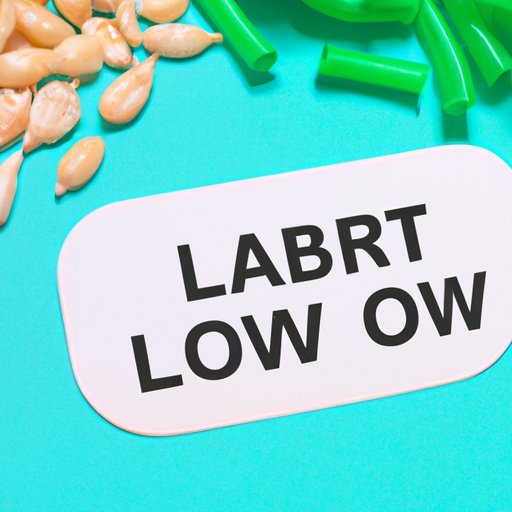Introduction
Low-carb diets have become increasingly popular due to their potential to promote weight loss and improve blood sugar control. However, some people following a low-carb diet have reported experiencing constipation. In this article, we will explore the link between low-carb diets and constipation, the science behind it, and provide actionable tips on how to avoid or manage constipation while following a low-carb diet.
The Surprising Link Between Low-Carb Diets and Constipation: What You Need to Know
Constipation is a condition characterized by infrequent bowel movements or difficulty passing stools. It can be caused by a variety of factors, including a low-fiber diet, dehydration, medication use, and certain medical conditions.
Research studies have shown that low-carb diets may increase the risk of constipation. This is because such diets restrict or eliminate high-fiber foods such as fruits, vegetables, and whole grains, which play a crucial role in maintaining proper bowel movement patterns. The lack of fiber in the diet slows down the passage of stools through the digestive tract, leading to constipation.
Additionally, low-carb diets may cause dehydration due to increased water loss through urine and sweat. Dehydration can lead to hard, dry stools, making them difficult to pass.
Can Cutting Carbs Cause Digestive Distress? The Truth About Constipation and Low-Carb Diets
Aside from constipation, low-carb diets may cause other digestive discomforts such as bloating and abdominal pain. This is because low-carb diets tend to increase the production of gas in the gut, leading to these symptoms.
Research has linked low-carb diets, particularly those low in fiber, to digestive issues such as constipation, bloating, and diarrhea. In one study, low-carb dieters reported lower stool frequency and harder stools compared to those following a high-carbohydrate diet.
How to Avoid Constipation While Following a Low-Carb Diet: Tips and Tricks
If you’re following a low-carb diet and experiencing constipation, there are many strategies you can use to prevent or alleviate it. Here are some tips:
- Increase your intake of fiber-rich low-carb foods such as leafy greens, nuts, and seeds.
- Incorporate more non-starchy vegetables in your meals, such as broccoli, cauliflower, and zucchini.
- Drink plenty of water and other fluids throughout the day to avoid dehydration.
- Use a fiber supplement such as psyllium husk to increase your daily fiber intake.
- Avoid low-carb foods that can worsen constipation, such as dairy products and processed meats.
Low-Carb and Dealing with Digestive Issues: Why Constipation Happens and How to Prevent It
If you’re following a low-carb diet and still experiencing constipation, it’s essential to listen to your body and adjust your diet accordingly. Some individuals may require a higher carbohydrate intake to promote proper bowel function.
Consulting with a registered dietitian or healthcare provider can help devise a personalized low-carbohydrate diet that will suit your needs and minimize the risk of constipation. In some cases, medication may be necessary to manage constipation caused by low-carb diets.
Exploring the Relationship Between Low-Carb Diets and Constipation: What Science Says
Several research studies have explored the link between low-carb diets and constipation, with mixed results. Some studies have found that low-carb diets increase the risk of constipation, while others have found no significant differences in bowel movement patterns between low-carb and high-carb diets.
A recent review of ten studies found that low-carb diets may indeed increase the risk of constipation. However, the review also suggested that the type of carbohydrate and fiber intake may play a more significant role in the development of constipation than the overall carbohydrate intake.
Why Constipation Might Be a Sign That Your Low-Carb Diet Needs Adjustment
Constipation is your body’s way of telling you that there is an issue with your diet. If you’re experiencing constipation while following a low-carb diet, it may be a sign that you need to make adjustments to your fiber and fluid intake, as well as your overall carbohydrate intake.
Constipation can be managed by incorporating high-fiber low-carb foods and drinking plenty of water. Making these adjustments may take some experimentation, and working with a registered dietitian or healthcare provider can help you find the right balance for your body.
Conclusion
In conclusion, a low-carb diet may increase the risk of constipation due to the lack of fiber and increased risk of dehydration. However, it is possible to prevent or manage constipation while following a low-carb diet by incorporating fiber-rich low-carb foods, drinking enough fluids, and adjusting your carbohydrate intake to suit your body’s needs. If you’re experiencing persistent constipation, it’s essential to seek medical attention to rule out any underlying conditions that may require treatment.
(Note: Is this article not meeting your expectations? Do you have knowledge or insights to share? Unlock new opportunities and expand your reach by joining our authors team. Click Registration to join us and share your expertise with our readers.)
